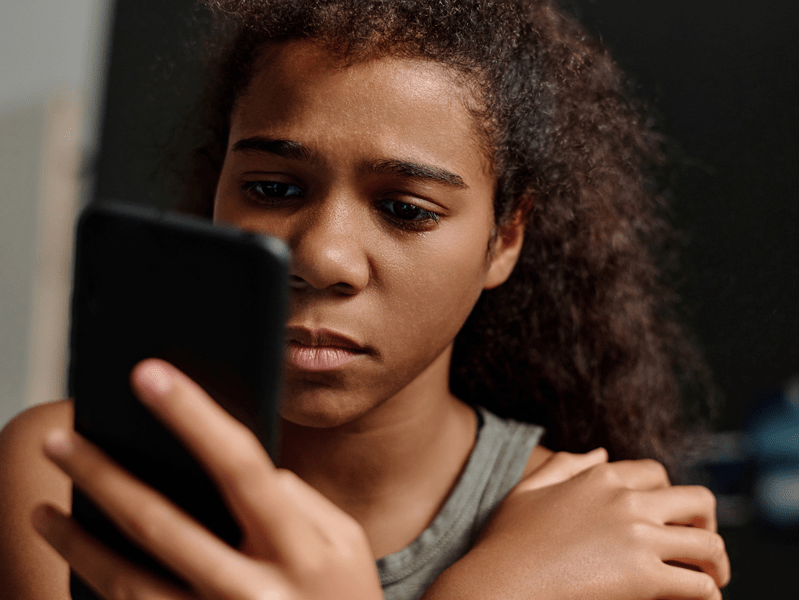Last Updated on 3rd November 2023
Read the script below
Natalie: Hello and welcome to Safeguarding Soundbites. I’m Natalie
Colin: And I’m Colin. This week, we’re bringing you a special episode of our weekly podcast.
Natalie: That’s right – today we’re going to be talking about mobile phones in schools.
Colin: And one of the reasons why we’re talking about this today, is because we’ve seen quite a few media reports recently about this topic.
Natalie: We certainly have, in particular around a report from the UN agency UNESCO. We’ve seen some headlines that would suggest they have recommended phones be banned in schools globally. How-ever…
Colin: – There’s a big ‘however’ here!
Natalie: There is! Because it seems that, while a UN department has indeed put out a lengthy report that discusses the use of mobile phones in schools…they haven’t actually suggested that mobile phones be banned in schools!
Colin: Well, that’s a bit confusing! And I know we’re going to get into that story a little bit later but first, I want to highlight that, although it may be the UNESCO story that’s put it in the news cycle during the last few weeks, this isn’t something new. We’ve heard talk about the banning of mobile phones hitting the headlines again and again.
Natalie: Yes and for lots of different reasons – due to increases in online bullying, because of dangerous TikTok trends doing the rounds, young people going on strike at school and posting their videos and complaints to various social media platforms during school hours…the issue has come up again and again.
Colin: So this UNESCO report is just what’s sparked the conversation this time around. And we’re also going to talk a little later about the language that’s used – While I understand why it’s being used I don’t think using the word ‘ban’ is necessarily helpful or correct.
Natalie: But it’s good clickbait!
Colin: It certainly is! Now, as well as the UNESCO news, there has also been a recent announcement by Education Secretary Gillian Keegan about mobile phone use in schools in England. Natalie, would you tell us a bit about this?
Natalie: Yes, so the education secretary and the Department for Education have said mobile phone use should be banned in schools across England to improve behaviour. This ban would include phone use during breaktimes as well as during lesson time. The statement said that new guidance will be produced, supporting head teachers in the ban.
Colin: Do we know when the guidance will be released?
Natalie: No, there hasn’t been a release date given but the guidance is in progress.
Colin: Okay. And you mentioned that the statement said this was about improving behaviour?
Natalie: Yes, they also talk about tackling disruptive behaviour and online bullying and supporting the wider work of the government in raising standards in schools by “increasing students’ focus and reducing distractions”.
Colin: Quite strong messaging there! Is this is to be non-statutory guidance?
Natalie: For now, but the statement also says if schools fail to implement the ban, it may become legislation.
Colin: Interesting. So now let’s talk about the UNESCO phone ban that’s been in the news lately. Let’s start with what UNESCO have said.
Natalie: Actually, let’s start with who UNESCO are!
Colin: Good point! So, UNESCO are the United Nations agency that oversees several UN programmes, including education. They also oversee sciences, communication, and culture – our listeners may have heard of them before through this last one…you might have heard the term ‘UNESCO world heritage sites’.
Natalie: Ah yes, like the Great Wall of China.
Colin: Exactly! So that’s the same UNESCO! But, as I say, they also cover education matters, which is what we’re talking about, rather than the Great Wall of China or Northern Ireland’s very own… Giant’s Causeway – which is also an UNESCO World Heritage Site, if you didn’t know –
Natalie: – I did not! –
Colin: A quick promotion for the Northern Ireland tourist board, But yes, back to the story! Which is that we’ve seen this reported in the media as ‘UNESCO calls for global ban of smartphones in schools.’ But when you investigate what they’ve actually said, they’re recommending technology should only be used in classrooms when it supports learning outcomes.
Natalie: Well, that’s quite different!
Colin: It certainly is! And a view I’m not sure is clear within the debate. This is a report that came out in July and within the report, it states: “To help improve learning, digital technology should not replace but instead complement face-to-face interaction with teachers.” It outlines that some tech can support some learning in some contexts but that this is not true when tech is over-used or inappropriately used. The report also goes on to say that smartphones can disrupt learning in classrooms.
Natalie: To be very clear on this, they haven’t said ‘all tech is bad in education’. They’re saying that it should be used to enhance the learning experience and it should be used appropriately.
Colin: Exactly.
Natalie: So, where has the confusion come from around this report? It seems to have been misinterpreted quite a bit.
Colin: It’s unclear but the report does give examples of where smartphones have been banned or removed in classrooms and that as a result, learning outcomes were improved for those pupils. But it also mentions other examples of tech being used excessively and inappropriately and in those circumstances, there were detrimental effects.
Natalie: Which reinforces their message…that it’s about how tech is used, not if it’s used.
Colin: And as well as using tech to complement the learning experience, I think it’s important that children and young people are educated and empowered today in how to use technology appropriately. Phones are a part of our everyday life – young people live in a converged online-offline world and as they get older, that’s not going to change.
Natalie: Right. We use our phones to socialise, for work, to learn, to relax and to play.
Colin: And so, it’s important we’re teaching our children and young people about appropriate use of phones – from understanding the importance of screentime limits to knowing how to use safety and privacy features.
Natalie: Very true. So, what has been the general reaction to the idea of a phone-ban in schools?
Colin: Generally speaking, we can divide it into two camps – the ‘for’s and the ‘against’s!
Natalie: Ha! So who are some of the ‘for’s?
Colin: Obviously the Education Secretary in England.
Natalie: Yep, would be a bit weird if she was against her own guidance!
Colin: True. We’ve also had some others from the government come out in support of mobile phone bans in the past, such as Gavin Williamson in 2021 and Nick Gibb in 2019.
Natalie: And the government’s behaviour adviser was quoted in the statement from the Department for Education that I was talking about earlier. He also said on X, formerly Twitter, that he was delighted with the prospect and that from a safeguarding, learning and growth point of view, it’s the right decision.
Colin: Then, in the ‘against’ corner, we have the General Secretary of the Association of School and College Leaders said the majority of schools have robust policies about mobile phones already. And in Scotland, there’s been a lot of talk about how a ban would impact young carers who are worrying about the person they take care of while they are at school.
Natalie: And we know that a lot of young carers can go under the radar, with schools, teachers and their peers not even knowing they are a carer for someone.
Colin: Yes, which then raises the issue of them perhaps skipping school instead or their schoolwork suffering. There’s a lot of work to be done in helping and training school staff to identify young carers.
Natalie: Yes, that’s much needed.
Colin: Here in Northern Ireland, there has been no official mobile phone ban issued to schools from politicians, due to the that is currently no devolved government at present. Many schools do have their own policies in place however it may range from a ban of the possession of a phone within the school to appropriate use or when directed by teachers to do so.
Natalie: Furthermore, teachers Unions in Northern Ireland have said that any move to bring in a phone ban will have little effect on the behaviour problems they are aiming to address and it’s diverting the attention from the real issues teachers are facing. Unions have also raised the point about parental opposition to a ban, as many young people need their phone travelling to and from school.
Colin: Yes and that’s why it’s being described by many teachers voices as ‘unworkable’.
Colin: Also, an ongoing study by the University of Birmingham has found that 90% of the secondary schools they looked at in England restrict the use of smartphones during school hours. Some have a ‘see it, hear it, lose it’ approach. Others allow use during break time and lunch time. And they also found that teachers would like more guidance on the issue of smartphone use in schools.
Natalie: That’s not surprising because it seems like there’s almost mixed messaging. And it’s also difficult if it’s down to the teachers – it’s not great if one teacher is a little more lax whilst another is quite strict.
Colin: Or even school-by-school; if one school bans it but another doesn’t and you have siblings going to different schools, that’s difficult for both those young people and also for their parents/carers.
Natalie: Colin, I’m wondering…what about globally? Has there been countries that have implemented bans or other rules around mobile phone usage in schools?
Colin: So, in Spain, they have introduced bans in two regions and research in those regions found that bullying incidences were reduced amongst teenagers in the schools with bans. It also found positive effects in learning, with maths and sciences improving.
Natalie: Maths and science? The two subjects where you’re most likely to use the calculator…on your phone?
Colin: I know, ironic isn’t it?
In France, the government has passed a law banning the use of mobile phones during the school day, with exceptions for children with disabilities and during emergencies. And in Denmark, the use of devices will only be permitted if needed for the lesson and, again, for emergencies and for people with disabilities.
Natalie: I think overall I’m getting a sense that, while stronger rules are needed, most schools feel that there is a place for device and phone use as part of education.
Colin: Like we always say about screen time in general, this could be a case of needing to find balance and establishing healthy screen time habits.
Natalie: Yes, the concerns seem to be about screen time usage, about online bullying but also, for parents and pupils, they are concerned about being able to contact each other. And age comes into it as well – that maybe what’s right for secondary aged pupils isn’t necessarily what’s right for primary aged pupils.
Colin: And I also think it’s about having a uniformed approach. As I mentioned earlier, I think the use of language is important here – is the word ‘ban’ really the right word? The focus should be on appropriate device usage and giving pupils the tools and education they need about how to use phones appropriately. And speaking of pupils, we actually spoke to some children recently when we visited schools in Scotland and their voices were really really important to hear in this debate. They were calling for appropriate use, in fact some young people were actually saying children who have diabetes needed to check their blood sugar levels, actually mobile technology was really important for them to have in class, now a very mature response for P6 and P7 students. But also young people were concerned that they wouldn’t be able to contact their parents, in fact that was also a problem from the school, parents turning up at the doors of a school and the school not being informed on why they turned up, in fact they had not only been contacted by a mobile phone but also by a smart watch saying that they weren’t feeling well and to come and pick them up, but the class teacher wasn’t aware of the situation. So understanding various aspects of this are really important.
Natalie: Aww brilliant, who’d have thought what mature responses from such young people, that’s amazing!
So from those examples we can see that tech can be used for good…again, it is about balance – how can schools incorporate the good aspects of tech to complement their teaching, without supporting increased screen time and the use of social media as a distraction or for bullying? I think this is a good moment to introduce Jim Gamble, CEO of INEQE Safeguarding Group. Jim, what are your thoughts on mobile phone bans in schools?
[Jim Gamble tells his thoughts on the mobile phone ban in schools]
Colin: I think it’s been really interesting to have this discussion with you today, Natalie, and I’d love to know what our listeners think also! We have launched a survey on our Safer Schools NI App, asking what you think about mobile phone bans so be sure to get on the app and having your say. And we have resources on screen time available on our Safer School NI App, which is free and available right now to download, and on our website saferschoolsni.co.uk.
Natalie: Make sure to follow us on social media, too. You can search for Safer Schools NI to find us. Thank you for tuning in today – next week, we’ll be back with our usual weekly roundup of safeguarding news and alerts.
Colin: Thanks from me, too, and until next week…
Both: Stay safe!
Join our Safeguarding Hub Newsletter Network
Members of our network receive weekly updates on the trends, risks and threats to children and young people online.
Who are your Trusted Adults?
The Trusted Adult video explains who young people might speak to and includes examples of trusted adults, charities and organisations.
Pause, Think and Plan
Use our video for guidance and advice around constructing conversations about the online world with the children in your care.








